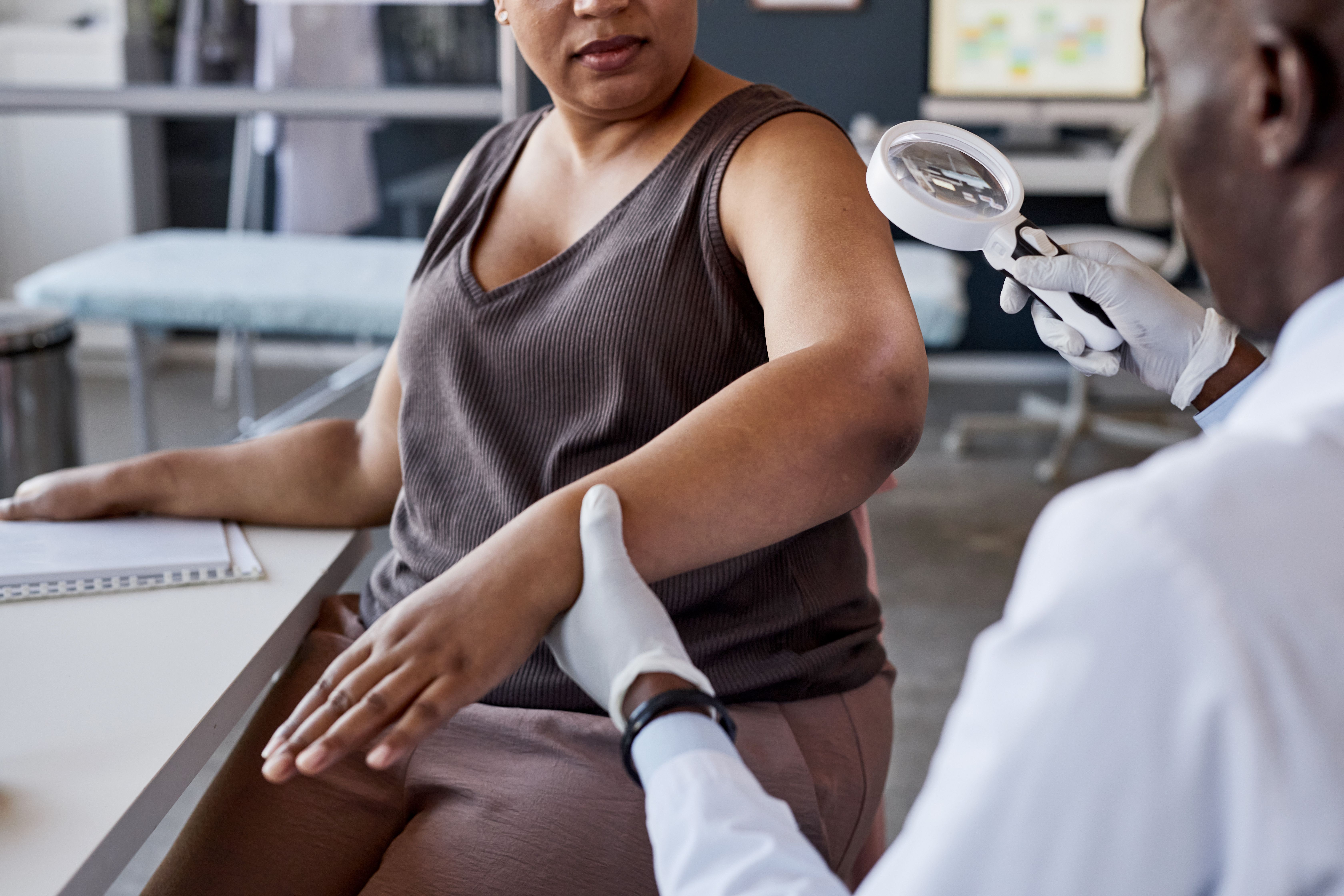- Center on Health Equity & Access
- Clinical
- Health Care Cost
- Health Care Delivery
- Insurance
- Policy
- Technology
- Value-Based Care
Guselkumab Clears Scalp Psoriasis Across All Skin Tones
A new trial finds guselkumab is highly effective and well tolerated for moderate to severe scalp psoriasis in individuals with diverse skin tones.
In a study of adults with moderate to severe scalp psoriasis—most of whom had skin of color—nearly 70% achieved complete scalp clearance by week 48, with sustained improvements in quality of life and no serious safety concerns, highlighting guselkumab’s (Tremfya; Johnson & Johnson) strong efficacy and tolerability across the skin tone spectrum.1
This phase 3b, multicenter, randomized clinical trial is published in JAMA Dermatology.

“Results from cohort B of the VISIBLE randomized clinical trial demonstrated that guselkumab is highly effective for the treatment of moderate to severe scalp psoriasis in individuals with skin of color, inclusive of all objectively measured skin tones,” wrote the researchers of the study.
Guselkumab has emerged as a vital treatment option for individuals with moderate to severe scalp psoriasis, particularly among people of color who have historically been underrepresented in clinical trials.2 It has demonstrated rapid and substantial scalp clearance in patients of color with moderate to severe scalp psoriasis, along with marked improvement in scalp itch and patient-reported quality of life measures by week 16.
The researchers enrolled 108 adults with moderate to severe scalp psoriasis and skin of color at 45 sites across the US and Canada.1 Eligibility criteria included a scalp surface area (SSA) involvement of 30% or greater, a Psoriasis Scalp Severity Index (PSSI) score of 12 or greater, a scalp-specific Investigator’s Global Assessment (ss-IGA) score of 3 or greater, and at least 1 nonscalp plaque.
Participants were randomized in a 3:1 ratio to receive either guselkumab 100 mg at weeks 0, 4, and every 8 weeks thereafter, or placebo at weeks 0, 4, and 12, followed by crossover to guselkumab at weeks 16, 20, and every 8 weeks.
Data were collected between September 2022 and June 2024. Coprimary end points assessed at week 16 included achieving an ss-IGA score of 0 or 1 and a 90% or greater improvement in PSSI (PSSI 90). Secondary end points included complete scalp clearance (ss-IGA 0), PSSI 100, percentage changes in PSSI and SSA, Dermatology Life Quality Index, Psoriasis Symptoms and Signs Diary, and reduction in Scalp Itch Numeric Rating Scale (NRS) scores.
At week 16, participants who received guselkumab demonstrated significantly higher response rates compared with placebo: 68.4% achieved an ss-IGA score of 0 or 1 vs 11.5% with placebo, 65.8% achieved PSSI 90 vs 3.8%, 57.9% achieved complete scalp clearance vs 3.8%, and 59.2% achieved PSSI 100 vs 3.8%; P < .001.
Among those with a baseline Scalp Itch NRS score of 4 or greater, 69.4% of patients in the guselkumab group experienced a 4-point or greater reduction compared with 24.0% in the placebo group (P < .001). By week 48, mean (SD) percentage improvements in PSSI and SSA among participants randomized to guselkumab were 94.6% (12.2%) and 94.8% (16.2%), respectively, with 67.1% achieving ss-IGA 0.
Furthermore, significant quality of life improvements were observed. Infections were the most common adverse event, but none were serious.
However, the researchers acknowledged several limitations to their findings. First, PASI and IGA were unable to capture dyspigmentation—a clinically relevant measure of disease burden in individuals with skin of color. Additionally, patients with Fitzpatrick skin types IV to VI are disproportionately affected by postinflammatory pigment alteration, which can significantly impact quality of life. Also, although baseline Skin Discoloration Impact Evaluation Questionnaire scores indicated a moderate impact of discoloration on quality of life, scores improved to reflect only a mild effect after 3 doses of guselkumab, with benefits maintained through week 48.
“Cohort B of the VISIBLE randomized clinical trial provided important clinical results demonstrating that guselkumab is highly effective for the treatment of moderate to severe scalp psoriasis in individuals with skin of color across the spectrum of objectively measured skin tones,” wrote the researchers. “At week 48, mean SSA and PSSI improvements of more than 94% were observed and were associated with clinically meaningful reductions in psoriasis symptoms and quality-of-life improvements.”
References
1. McMichael A, Shahriari M, Stein Gold L, et al. Guselkumab for moderate to severe scalp psoriasis across all skin tones. JAMA Dermatol. Published online June 25, 2025. doi:10.1001/jamadermatol.2025.1849
2. Steinzor P. Guselkumab demonstrates significant improvements in people of color with scalp psoriasis. AJMC®. January 22, 2024. Accessed July 14, 2025. https://www.ajmc.com/view/guselkumab-demonstrates-significant-improvements-in-people-of-color-with-scalp-psoriasis
